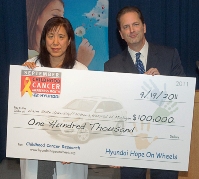
Hyundai Hope on Wheels and the Metro Detroit Hyundai dealers awarded a $100,000 Hope Grant to Joann Wang, M.D., assistant professor of Pediatrics for the Wayne State University School of Medicine and Children's Hospital of Michigan, to fund her research on the treatment of high-risk neuroblastoma.
Neuroblastoma is the most common malignant extracranial solid tumor of childhood cancer, and cancer is the leading cause of death from disease of American children.
Dr. Wang received the grant Sept. 19 during a ceremony at Children's Hospital of Michigan. Her study, "Integration of Histone Deacetylase Inhibitor in the Treatment of High-Risk Neuroblastoma," one of 71 projects supported by Hyundai Hope on Wheels' 2011 Hope Grant program, which awarded $7.1 million to support research and programs in honor of National Childhood Cancer Awareness Month.
"While childhood cancer rates are now at 80 percent, there is so much work that still remains," said Brian O'Malley, regional general manager for Hyundai Motor America. "The goal of Hope on Wheels is that these grants go toward research that influences, or even becomes, a cure for these children."
Hyundai Hope on Wheels is the united effort of Hyundai Motor America and its more than 800 dealers to raise awareness about childhood cancer. The program has committed more than $43 million in donations to pediatric cancer research since its 1998 inception.
Neuroblastoma, Dr. Wang explained, accounts for nearly 11 percent of all pediatric cancers and 15 percent of all pediatric cancer deaths. Approximately 650 new cases are diagnosed in the United States.
"Neuroblastoma remains a major therapeutic challenge in pediatric oncology despite decades of intensive research and therapeutic trials," she said. "With current treatment protocols, including high-dose chemotherapy with autologous stem cell transplantation, radiation and surgery, patients with high-risk metastatic neuroblastoma have long-term survival rates of less than 40 percent. This highlights the chemotherapy-resistant nature of this tumor. Therefore, new agents are urgently needed to overcome chemotherapy resistance so as to improve the treatment outcome of this deadly disease in American children."
Dr. Wang said her research will lead to the development of novel treatment approaches for children with neuroblastoma by integrating new therapeutic agents such as Histone Deacetylase Inhibitors. The study will establish the molecular mechanisms underlying the synergy between HDACIs and DNA-damaging drugs in neuroblastoma tumor cells, and will provide a "solid foundation" for clinical evaluation of panobinostat with standard chemotherapy drugs in high-risk neuroblastoma. The ensuing better understanding of the biological function of individual HDACs may lead to the development of more effective therapies with this class of agents, including the development of new drug combinations and new rationally designed HDACIs.